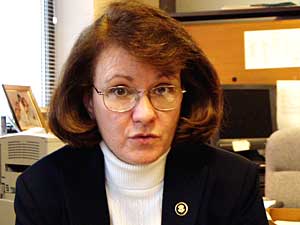Photos
Respond to this story
| ||||||||||||||||||||||||||||||||||||||||||||||
Academic standards will dominate education debate
January 30, 2004
 |
| Education Commissioner Cheri Pierson Yecke is pushing new academic standards and the governor's list of proposed school reforms. (MPR Photo/Tim Pugmire) |
St. Paul, Minn. — Minnesota lawmakers have already begun working on the key education issue of the 2004 session. House and Senate committees held initial hearings on the revised science and social studies standards proposed for all elementary and secondary schools.
 | |||
Complaints about both plans continue to pile up. Some parents claim the science standards would wrongly allow the theory of evolution to go unchallenged in classrooms. Many teachers say the social studies workload is far too heavy.
Sen. Steve Kelley, DFL-Hopkins, chairman of the Senate Education Committee, says the standards are not passable in their current form.
"If it's possible to get them into shape that can pass the Legislature, that's worth trying to do," Kelley said. "The changes needed might be so large that we can't get it done."
Members of the House Education Policy Committee have heard the same complaints. But Rep. Barb Sykora, R-Excelsior, the committee chairwoman, indicated at a hearing this week that she's reluctant to make big changes.
|
If we rewrite the (science and social studies standards), we will have the same issues we have now because somebody else won't like the rewritten document. No matter what you do, you can't please everybody.
- Rep. Barb Sykora, chair of the House Education Policy Committee |
"If we rewrite the document, we will have the same issues we have now because somebody else won't like the rewritten document," Sykora said. "No matter what you do you can't please everybody. I think all of us sitting around this table have certainly learned that."
Approval of the science standards is crucial. The federal No Child Left Behind Law requires annual science testing based on state standards. Education Commissioner Cheri Pierson Yecke says schools need to start implementing the science standards this summer, because the new tests begin in 2006. She says social studies implementation can wait another year, because there are no pending tests. Still, Yecke says she wants both documents approved this session with few changes.
"People are airing their opinions, airing their concerns," Yecke said. "But I feel very confident that we'll be able to come to closure on both science and social studies this session."
Yecke is also optimistic about the rest of her boss's education agenda. Gov. Pawlenty wants to expand charter schools, encourage small school districts to share administrative costs, and withhold driving privileges from students who miss too much school.
The Republican governor also wants students reading by the end of first grade, and lower Internet costs for rural schools. It's an ambitious list, but the price tag is relatively small. The reading initiative, for example, would be covered by federal grants.
Pawlenty has caused the biggest stir with his "super teachers" plan. The proposed $3 million pilot program would lure top teachers to struggling schools, with a chance to earn up to $100,000 in salary and bonuses.
Rep. Alice Seagren, R-Bloomington, chairwoman of the House Education Finance Committee, says she likes the idea.
 | |||
"What he wants to do is put together a cadre of really good teachers, pay them well, kind of like combat pay in a way," Seagren said. "Because there is a terrific amount of burnout when you're really dealing with complex situations with kids."
House Democrats have dismissed most of the governor's initiatives as gimmicks. Their alternative proposals include a world language requirement for all students and anti-bullying efforts.
Rep. Mindy Greiling, DFL-Roseville, says they also want to reinstate a state board of education, which would appoint a non-partisan education commissioner.
"To have that one area have a non-partisan commissioner would set the tone for something that should be seriously always prioritized, and not turned into a political football," Greiling said.
The DFL Senate will determine Commissioner Yecke's future this session, when it reviews the governor's cabinet appointments. Some critics claim Yecke is managing public education with a right wing political ideology. Yecke says she should be judged on her accomplishments, not politics.
|
News Headlines
|
Related Subjects
|

